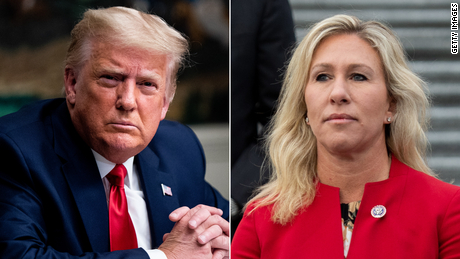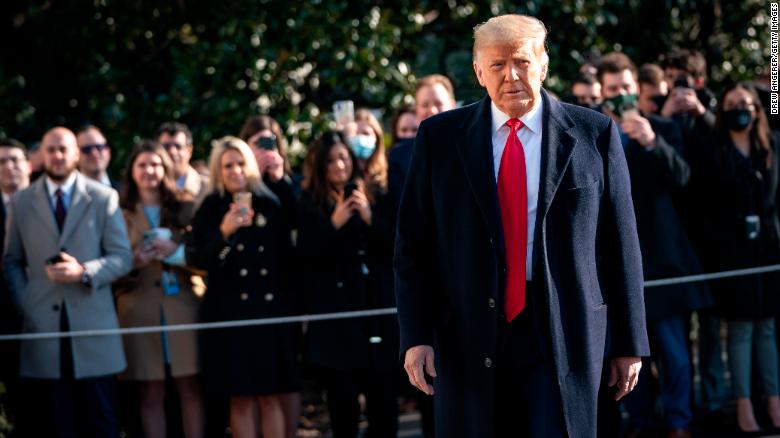The end of Trump's trial lifts an oppressive cloud from Washington
(CNN)The conclusion of Donald Trump's impeachment trial finally ends the ex-President's stranglehold on Washington's every waking moment and offers President Joe Biden a first chance to fully exercise his influence and power.
While the coming days in Washington may not be as wrenching as last week — which saw a horrific recreation of the terror inside the Capitol on January 6 by
House impeachment managers — they will be even more critical to the
nation's short-term fate. Biden can now claim the full attention of
Congress and the public as he seeks to drive through his relief package and end the pandemic and will make his first official trip out of Washington since being sworn in, including to a CNN town hall in Wisconsin on Tuesday.
The
new President is already moving aggressively to fill the post-Trump
vacuum. He forcibly pushed his $1.9 trillion Covid-relief plan on Monday
morning in a statement marking the reopening of open enrollment for the
Affordable Care Act.
The
legislation "will ramp up testing, tracing, and our national
vaccination program," Biden said, adding that it would also "take big
steps to lower health costs and expand access to care for all Americans,
including those who have lost their jobs."
Biden's first 100 days
- Biden moves on after Trump's second impeachment acquittal
- Biden's special Obamacare enrollment period opens Monday. Here's what you need to know
- The end of Trump's trial lifts an oppressive cloud from Washington
- Biden calls on Congress to 'enact commonsense gun law reforms' on third anniversary of Parkland shooting
But the acquittal of Trump, who tried and failed to kill the ACA, at the hands of a majority of Republican senators Saturday
proved the former president's personality cult will make him a dominant
force in the civil war gripping the party in the run-up to the 2022
midterm elections. His staying power, even while out of office, will
therefore still have a huge impact on the mood in Washington, and
Biden's ability to bring the nation together and advance his priorities.
Prominent Republicans like Senate Minority Leader Mitch McConnell and potential 2024 presidential candidate Nikki Haley
are already maneuvering to take the party in a different direction.
Only time will tell whether Trump's influence will be quite so
omnipresent when he is miles from the action in his luxury resort in
Florida and Congress is no longer debating his political fate. And a flurry of legal concerns,
stemming from his past business practices and attempts to steal last
year's election could further damage the future political prospects of
an ex-President who was willing to destroy US democracy in a bid to stay
in power.
Biden's chance
The
end of the impeachment trial means that for the first time since he
became president last month, Biden will be able to bring the power of
his office to bear, as he steps up his effort to win swift passage of
his relief plan with a 50-50 Senate that Democrats control because of
Vice President Kamala Harris' ability to break ties. The President will
begin trips out of Washington this week — a rite of a new administration
so far trimmed by Covid-19. On Friday, Biden will seek to restore US
global leadership in another departure from the Trump administration, by
taking part in a virtual meeting of G7 leaders to discuss the pandemic.
Sen. Chris Murphy made a case
on "State of the Union" Sunday that Democrats had effectively managed
the trial, advanced Biden's Cabinet nominees and are conducting
negotiations on the Covid-19 relief package.
"We
have been doing three things at once," the Connecticut Democrat said.
But that balancing act would have come unstuck had the trial dragged on
much longer — a factor in Democratic senators pushing back at a surprise
bid on Saturday by House Impeachment managers to call witnesses.
There
is no time to lose since the success of Biden's presidency — and the
nation itself — will depend on his capacity to end the pandemic and
rescue the economy. And the crisis is at a pivotal point. Cases of the
virus are falling fast and death tolls, which typically lag new
infections, will soon do the same. But new variants of Covid-19
that appear more contagious are spreading. This makes new funds for a
vaccination drive contained in the congressional package increasingly
crucial. With extended unemployment benefits set to run out in March,
millions of Americans are relying on Congress. The bill also includes
billions of dollars in funding to safely reopen schools — an
increasingly troublesome political issue for the White House and a
paramount concern for desperate parents.
"The
American Rescue Plan has resources, $130 billion of resources, to
facilitate and help schools get there," Dr. Rochelle Walensky, the
director of the US Centers for Disease Control and Prevention said on
"State of the Union" on Sunday.
Her
comments reflected the new reality that with Trump out of the picture,
Biden is about to experience the full glare of scrutiny over the
pandemic, the economy and every other unsolved national problem that
ends up on a president's desk.
The GOP's never-ending Trump dilemma
The
trial showed that the Republican Party is in essentially the same place
it has been since Trump descended his golden escalator in 2015. Many of
its most prominent establishment leaders disdain the ex-President but
remain scared to confront him because of his almost mystical bond with
the conservative base. This has recently led the House GOP to legitimize
its extremist, conspiratorial wing, by embracing pro-Trump Rep. Marjorie Taylor Greene
— a strategy that threatens to drive away more centrist voters. Members
of the House and Senate who voted to convict Trump, meanwhile, have
faced censure from state parties and a backlash from voters back home.
There
is the tiniest of openings for those who want to take the party in a
post-Trump direction. Haley, the former US ambassador to the United
Nations and ex-South Carolina governor, used a Politico Magazine interview to
distance herself from the ex-President ahead of his acquittal last
week. And Maryland Gov. Larry Hogan, another possible 2024 presidential
hopeful, laid out the case for change on Sunday.
"This
is not over. We're going to decide over the next couple of years what
the fate of Donald Trump and the Republican Party is," Hogan told Jake
Tapper on CNN's "State of the Union."
Trump
is treating his escape from justice as a political win, promising to
"emerge soon" into the spotlight. The ex-President plans to use upcoming
midterm primaries to seek revenge on Republicans who turned on him and
to prove his staying power as the GOP's de-facto leader.
Yet he has other worries. CNN has reported that the ex-President fears that
he could face criminal charges over his incitement of the mob on
January 6. And the legacy of the trial, and what it exposed, could
permanently damage Trump. Stunning video evidence showed just how close
to danger then-Vice President Mike Pence and lawmakers came -- and CNN's Friday night reporting of
new details about Trump's January 6 phone call with House Minority
Leader Kevin McCarthy raised serious questions about what the President
knew and when. While it is conceivable that Trump could be a strong
presidential primary contender in 2024, it's more of a stretch to see
him as a viable national candidate given the extreme methods he took to
cling to power in 2020.
McConnell's gamble
Republicans'
unwillingness to constrain Trump has led to two impeachments, the loss
of the White House, the House and the Senate, multiple abuses of power
and Trump's botched handling of a pandemic that has killed nearly half a
million Americans. But the party's demographic foundation means that
the only route to power still relies on a juiced turnout by Trump's most
loyal supporters.
This
clash between power and principle is best underscored by McConnell's
contradictory behavior in the trial. The Kentucky Republican voted to
acquit Trump on the dubious basis that the Constitution bars trying an
impeached President once he has left office.
But immediately after casting his vote, the GOP leader blasted Trump
in a speech on the Senate floor, saying his actions before the riot
were a "disgraceful, disgraceful dereliction of duty." The straddle left
McConnell facing charges of hypocrisy and extreme political expedience,
especially since he set up the constitutional excuse for senators
embarrassed to confront Trump's crimes by refusing to hold the trial
when Trump was still serving.
But
everything McConnell does is explained by his driving desire to keep
his conference together in the service of maintaining or recapturing
power — in this case in next year's midterms.
McConnell had seen how Rep. Liz Cheney had to fight for
her No. 3 post in House Republican leadership after voting to impeach
Trump. Had he cast a similar vote, he would have surely faced a fight
for his leadership or at the very least seen his authority with his
conference shattered.
McConnell laid out the naked pragmatism of his thinking in a Politico interview
— effectively signaling an effort to purge Trumpian influence — unless
he needed pro-Trump candidates to help win back the Senate.
"The only thing I care about is electability," McConnell said.
It
is this kind of cynical strategizing that has made McConnell one of the
most powerful congressional leaders since Lyndon Johnson. It has also
led the Republican Party to a point where it cannot summon itself to
punish a former President who staged an effective coup after losing an
election.






No comments